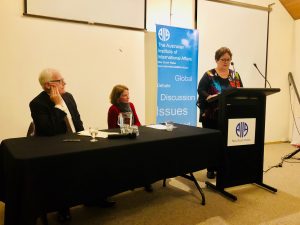To Ratify or not to Ratify: is the new TPP worthwhile?
On Tuesday 22 May, Dr Elizabeth Thurbon, Associate Professor of International Political Economy at the UNSW School of Social Sciences, gave a talk on the new Comprehensive and Progressive Agreement for Trans Pacific Partnership (TPP-11) and its impacts on the Australian economy. Dr Thurbon discussed whether it is beneficial for Australia to ratify the deal and, unlike many officials in government, argued that the risks which the deal poses ultimately outweigh its benefits.
Dr Thurbon’s first made clear that not all those against the TPP -11 are ‘protectionist’ or ‘isolationist’. In fact, many components of the deal, she argued, have very little to do with free trade at all. One of her main concerns was that the deal allowed far too many provisions for global corporations to block government policy which went against their own interests. The provision of Investor-State Dispute Settlements (ISDS), a mechanism which gives corporations access to international tribunals to resolve disputes with governments, was of particular concern. ISDS provisions, Dr Thurbon argued, leave policy makers vulnerable to corporate backlash and entrench corporate power in both the global and domestic arenas.
Furthermore, policymakers in Australia had not been given enough access to properly assess the provisions of the deal. The government, wishing to fast track the agreement’s ratification in parliament, has underplayed the importance of prior modelling and consultation not only with policy makers, but with the wider public as well.
Intellectual Property (IP) provisions of the agreement were far too skewed towards the interests of corporations, particularly those in the pharmaceuticals industry. These provisions would have a negative effect on access to affordable medicine, especially for developing countries and their fledgling systems of healthcare. And, although many IP related provisions had been currently suspended, there was always the very real possibility of their reintroduction being used as a bargaining chip to entice the United States to re-join the agreement in the future.
Dr Thurbon argued that geopolitics – not economics – was the main consideration for the implementation of the TPP-11. In order to stem the rise of global powers such as China, Australia had sought to tightly integrate its economy with other neighbouring countries. But Australia’s interests would be better served if we invested more heavily in helping our regional neighbours develop their own economies. Australia should seek to become a policy maker rather than a policy taker and should work within the region to create more sustainable and fairer frameworks of international free trade.

DFAT State Director Rhonda Piggott addresses the Institute; seated are Dr Liz Thurbon of the University of New South Wales and AIIA NSW President Ian Lincoln
Ms Rhonda Piggott, director of the DFAT NSW state office and an experienced DFAT trade policy negotiator, briefly provided the government’s perspective on the deal after Dr Thurbon’s address. She argued that, despite what some see as imperfections, the TPP-11 as a whole will have a positive impact on the Australian economy. It presented significant opportunities for Australian industries such as wine and beef to penetrate untapped markets.
Dr Thurbon had argued for the importance of prior economic modelling, but attempts at modelling had failed to predict the actual results of prior free trade agreements, especially in the services industries. Modelling also didn’t lend itself to the TPP’s outcomes on rules.
Australia did not start negotiations with ISDS on the table, but others had wanted it. We had agreed with others on a number of caveats that would protect governments’ rights to make policy, particularly in respect of health and environmental protection.
Ultimately, the TPP-11 provided a significant opportunity for Australia to expand its interests in establishing regional economic architecture, which was needed now more than ever.
Report by Christopher Khatouki
AIIA NSW Intern